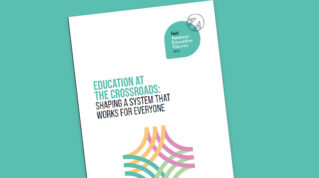Given the unusual way the schools white paper and SEND green paper were published on consecutive days in late March, it is understandable that the sector is still trying to make sense of them. It’s no less surprising that school leaders are still reeling at its vision for both a 90 per cent literacy and numeracy target and a sudden shift to a virtuous national system for pupils with special educational needs.
It would perhaps be easier to take in if there was any sense of a common vision between these two documents. Or any connection at all. Ministers seem a little touchy about the idea that there isn’t one. But while they have failed to highlight it, one thread does tie these otherwise disparate sets of aspirations: a failure to appreciate the importance of speech and language, and the toll the pandemic has wrought on this foundational skill.
Our research at I CAN has found that 1.5 million children are at risk of not being able to speak or understand language at an age-appropriate level. If these children continue to struggle, they are over four times less likely to get good GCSEs in maths and English. Similarly, we know that children who are able to talk, using words or alternative communication methods, are far more likely to achieve the green paper’s aspirations of a good education, good friends, good mental health and a good social life.
The largest category of special educational need in primary schools is speech, language and communication difficulties, which cross over with many of the other categories of need (autism and mental health among them). For example, almost half of young people referred to mental health services have difficulties with spoken language.
Lack of speech and language skills is becoming a majority issue
Yet our failure to recognise the primacy of being able to speak and understand language was encoded in our comprehensive school system from the start, a focus on the three Rs belying an assumption that the vast majority of children would be able to talk and understand instructions from their teacher. Whatever the rightness of that assumption then, it is clear that this is a misguided approach now. No phonics programme or maths meeting will take the majority of children over the line in a system where teachers are telling I CAN that the lack of speech and language skills is becoming a majority issue, rather than a minority one.
And they are frustrated by the lack of national guidance and the lack of local capacity to provide support and specialist resources. The national leadership from the DfE is far outweighed by the scale of the problem.
At a recent parliamentary event Nadhim Zahawi spoke very highly of the Nuffield Early Language Initiative – the one programme the government has directly funded. Hallelujah! Now his enthusiasm needs to be reflected in his department’s own strategies. The consultation period must result in steps that will help to actually meet the 90 per cent white paper target by breaking the negative cycle identified in the green paper of needs being identified late and therefore escalating and becoming entrenched.
What needs to be done isn’t complicated. First, we need more training on speech and language for teachers at all levels. This is proportionate, given that in most classrooms at least three children will have a long-term language issue.
Second, we need a standardised tool for teachers to identify children who are struggling, and national reporting to track trends.
And finally, we need more evaluation of interventions that can make a difference so schools know where to turn for extra help. We currently have only one targeted spoken language intervention evaluated by the Education Endowment Foundation.
We know there is much that schools can do themselves, without needing to refer to stretched speech and language specialists in the NHS. But they need support to find the right, effective resources.
It’s a really simple choice. The 90 per cent target won’t be reached without this under-served 1.5 million children. So ministers must put the training, interventions and reporting in place, or accept that their aspiration is little more than wishful thinking.














Your thoughts